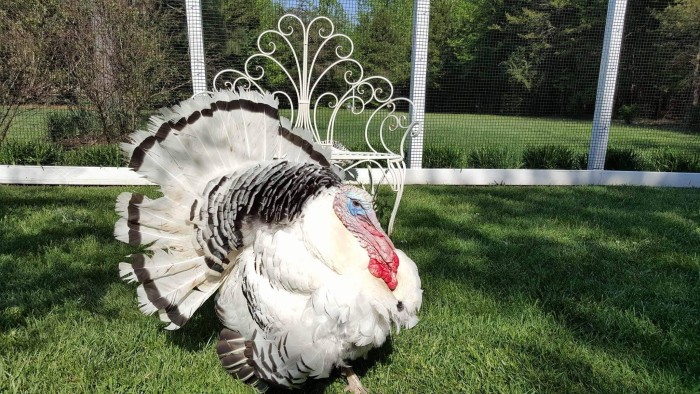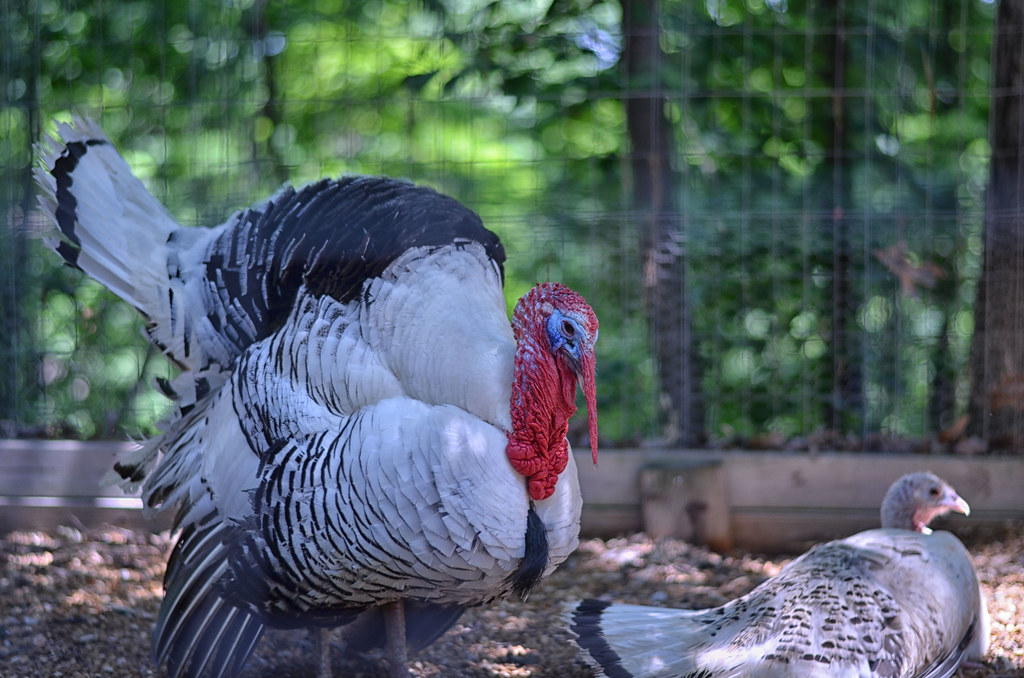Royal Palm Turkey Breed Information:
The Royal Palm turkey is a breed of domestic turkey known for its striking black and white plumage. The breed was developed in the early 20th century by crossing Narragansett, Bronze, and White Holland turkeys.
What are Royal Palm turkeys known for?
Royal Palm turkeys are known for their striking black and white plumage.
They are also recognized as a rare breed of domestic turkeys, and because of their small size and the sluggish pace of growth, they are best used for ornamental or show purposes rather than commercial production.
Are royal palm turkeys rare:
Yes, the Royal Palm turkey is considered a rare breed of domestic turkey. The breed was developed in the early 20th century by crossing Narragansett, Bronze, and White Holland turkeys.
They are not as common as other breeds such as the Broad-Breasted White turkey, which is the most common turkey breed raised for commercial production. Due to their small size and slow growth rate, they are not well-suited for commercial production, and as such, their numbers are not as high as other breeds.
How much do royal palm turkeys sell for:
The price for Royal Palm turkeys can vary depending on the location, the source, and the age of the bird.
On average, hatching eggs can be sold for around $5 to $15 each, day-old poults (chicks) can be sold for around $10 to $25 each, and mature birds can be sold for around $50 to $75 each.
However, prices may vary depending on the breeder or hatchery, as well as the demand for the breed in a specific area. It’s always best to check with a local breeder or hatchery to get the current prices.
Can Royal Palm turkeys breed naturally?
Yes, Royal Palm turkeys can breed naturally. They are a heritage breed of turkey and are capable of reproducing without human intervention. They have a strong instinct to mate and reproduce, and they are able to hatch and raise their own young.
However, breeding stock should be selected carefully to maintain the desired characteristics in the breed. It’s best to get breeding stock from reputable breeders that have experience with the breed.
What is the lifespan of a Royal Palm turkey?
The lifespan of a Royal Palm turkey can vary, but it is generally around 2-4 years. However, some birds can live longer if given proper care and nutrition.
It’s important to note that commercial turkeys, which are often produced for meat, may not live as long as heritage breeds like the Royal Palm, which are often kept for show or for preserving the breed.
Heritage breeds are generally hardier and have a longer lifespan than commercial breeds.
It’s always best to provide your birds with a balanced diet, clean water, and clean and comfortable living space to ensure they live healthy and long life.
How many eggs do Royal Palm turkeys lay per year?
Royal Palm turkeys are not primarily raised for egg production, and therefore they are not considered heavy layers. A typical Royal Palm turkey hen will lay around 30-40 eggs per year. This is less than commercial turkey breeds that are selected for egg-laying.
As they are not heavy layers, they are often kept for the preservation of the breed, or for showing and not for commercial egg production.
It’s worth noting that turkeys, in general, are seasonal layers, which means they will lay more eggs during the spring and summer months than they will during the fall and winter.
At what age do Royal Palm turkeys start laying?
Royal Palm turkeys typically start laying eggs at around 18-24 weeks of age, which is slightly later than commercial turkey breeds that are selected for egg production.
It’s worth noting that individual birds may begin laying at different ages, and some birds may not lay eggs at all. Factors such as genetics, nutrition, and overall health can affect a turkey’s ability to lay eggs.
It’s also worth noting that turkeys, in general, are not as productive layers as chickens and ducks, so the number of eggs that a turkey hen will lay is less than other poultry birds, and it’s more difficult to get turkey eggs.
What color are turkey eggs:
The eggs of Royal Palm turkeys are typically white. This is the most common egg color among turkeys. Some individuals may lay eggs that are slightly tinted or speckled, but for the most part, the eggs are white.
It’s important to remember that the quality or nutritional value of a turkey’s egg is not determined by its color. Pigments made by the bird’s body affect the color of the eggshell, and this color can change based on the breed and genetic makeup of the bird.
Also, keep in mind that Royal Palm turkey is not have heavy layers, so the number of eggs they lay will be limited compared to other poultry breeds.
Is royal palm turkey broody?
Yes, Royal Palm turkeys can be broody, meaning they will sit on and hatch eggs. Broodiness is a natural behavior for turkeys, and it’s a trait that is common among heritage breeds like the Royal Palm.
However, the rate of broodiness can vary from bird to bird and from flock to flock. Some hens may be more inclined to go broody than others, while some may not show any interest in hatching eggs at all.
Broodiness is a natural behavior that allows the turkey to hatch and raise her own young, however, it’s not always desirable for a flock owner as broody birds will stop laying eggs and can be less productive.
If you want to keep your birds productive, it’s best to discourage broodiness by removing eggs as soon as they are laid, and by providing birds with plenty of room to move around and engage in other activities.
Are turkeys friendly to humans?
Royal Palm turkey can be friendly with humans, especially if they are raised from a young age and are handled regularly. However, the level of friendliness can vary from bird to bird and from flock to flock. As with any animal, the individual’s temperament can depend on how they were raised, socialized, and treated by humans.
In general, heritage breeds like the Royal Palm, tend to be hardier and have a better temperament than commercial breeds that are selectively bred for certain characteristics.
By providing your birds with proper care, nutrition, and attention, you can help ensure that they are healthy and friendly birds.
Can a turkey bite you?
Yes, a royal palm turkey can bite you, just like any other turkey. They have sharp beaks and strong jaws that they use to peck and grab food. However, royal palm turkey is known to be friendly and docile, they are usually raised as ornamental birds and not for meat production.
These birds are usually not aggressive towards humans, but it is still possible for them to bite if they feel threatened, or scared or if they are not handled properly.
What to feed Royal Palm Turkey
Royal palm turkey is omnivores, which means they can eat a variety of different foods. They should be fed a balanced diet that includes:
- A high-quality turkey feed: This can be a commercial feed specifically formulated for turkeys or a game bird feed that contains the proper balance of protein, carbohydrates, and fats.
- Fresh greens: Royal palm turkey enjoy eating fresh greens such as lettuce, clover, and grasses.
- Grains: They also eat whole grains such as corn, wheat, barley, and oats.
- Protein: They also require protein in their diet, which can be provided through mealworms, crickets, or other live food, or through a feed supplement.
- Freshwater: They should always have access to fresh, clean water.
It is important to note that turkeys should not be fed animal products such as meat, dairy, or eggs, as this can lead to health problems. It’s also important to not overfeed them as this can cause health issues as well.






